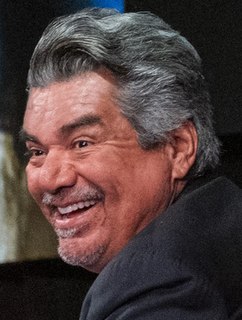A Quote by Woody Allen
What people who don't write don't understand is that they think you make up the line consciously — but you don't. It proceeds from your unconscious. So it's the same surprise to you when it emerges as it is to the audience when the comic says it. I don't think of the joke and then say it. I say it and then realize what I've said. And I laugh at it, because I'm hearing it for the first time myself.
Related Quotes
After a couple of rehearsals and a couple of takes, Sydney Pollack says, "Come here. Why are you not nervous?" And I [say], "Do you think it would be better if I was nervous?" And he says, "No, it's just I can't understand it - how you would be first time on a set, you're acting, when he flubs his line you make up a new line. It's very interesting." It's not that I think I'm great; that's what I knew I wanted to do.
When you watch an audience watching my movies, you realize that nobody laughs at the same time. Some people enjoy a beat, and then another group of people are laughing at a sight gag, and then someone laughs where nobody laughs before. They're not timed like a comedy. You're not supposed to laugh at every joke. You decide.
Your only guidepost is your own instinct and judicious editing. In my stand-up act I learned that in the first 10 minutes I could say anything and it would get a laugh. Then I'd better deliver. In the movie it's the same thing. You get a lot of laughs when people first sit down and then the story better kick in. Many years in front of an audience, I would hope, give me a sense of what works.
It's when I make a joke about Indian people and then a white person comes up to me and says, "That's wrong. You should not talk about Indian people," and the Indian people are over in the audience like, "I thought that joke was hilarious." That is so weird. Then why are you getting mad? You're burning unnecessary calories. You're getting made for the sake of getting mad. I don't understand it.
I think it's unhealthy to listen to what people say. My dad used to always say, "Don't believe in your own hype!" I was confused at the time: "Dad, there is no hype on me." But now I understand what he was saying. If someone says, "I think you're amazing" and someone says, "I think you're awful," I would like to have the same reaction to both, to be confident and calm enough to be able to take both of those and not be affected by either.
I've seen it in so many talented young women who hold back because they're not sure that what they say will be smart enough. Or maybe they've said something in a prior meeting, and people acted like they hadn't said it, and that was crushing. Then we have all had the experience where 20 minutes later, a man says the same thing and everybody responds positively.... So don't take it personally. Take it seriously so that you understand it, and then try to devise techniques to overcome it.
So, I think that for the authorities to say now that calling for sanctions will prevent dialogue is a ploy to stop us from supporting sanctions. It has to be the other way around: dialogue first, then we stop our call for sanctions, because sanctions make people understand that you cannot exercise repression and at the same time expect international support.
[There's] a joke that I've done forever: 'Nowadays they say that the largest majority of people will be Latino and you'll tell scary stories to your grandkids: "A long time ago when I was growing up, there used to be people who were white," and the kid says, "Really?" and you say, "Yeah, like the man who cuts our grass."' I've had that line forever and I love it.






































